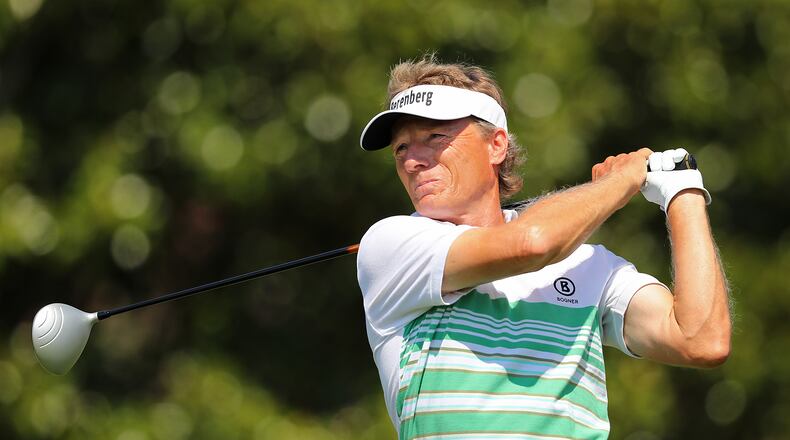By the time most PGA Tour Champions players reach 60, their best days are behind them. Their bodies ache, their hands shake and par is increasingly harder to break. Even if their exemption hasn’t run out, their tank of desire is closing in on empty.
That’s what makes the accomplishments of Jay Haas and Bernhard Langer amazing. In an arena dominated by players who are nine or 10 years younger, they have found a way to stay out of the La-Z-Boy and continue to compete at the highest level.
Haas won the Toshiba Classic in October when he 62 years old, the second-oldest player to win on the PGA Tour Champions. He has won 18 times on the senior circuit, two of them since he turned 60.
“It’s great to hold that trophy one more time,” Haas said. “When I won, I wondered, is that the last time? Then you think, well, I did it once. Why would six months or a year make a difference? And it does.”
It does to most people. The exception may be Langer, who turns 60 in August and has given no indication that he’s ready to slow down and start shopping for a reverse mortgage. The two-time Masters champion has won 30 times on the Champions tour. He’s won at least one tournament each year since he turned 50 and was victorious four times in 2016.
Langer comes into this week’s Mitsubishi Electric Classic with one win and three other finishes inside the top six in five events in 2017.
“This is a taxing golf course, lot of hills,” Langer said after his Thursday pro-am round at TPC Sugarloaf. “I’m tired right now. I’m going to be 60 soon. I don’t feel like I’m 20 or 30.”
He may not feel like a kid, but he doesn’t play like he’s an old guy, either. In 14 competitive rounds this year, Langer posted an under-par score on each one. He is a cumulative 59-under par, has an average score of 68 in 2017 and extended his streak of rounds of par or lower to 35.
“He is just incredible,” former Masters champion Larry Mize said. “I think we agree with that. To stay that competitive and stay playing so well …”
Two-time major champion Mark O’Meara said, “I think what Bernhard has accomplished is very comparable to what Tiger (Woods) did in those 10-11 years on the PGA Tour. The way he’s dominated is very similar. He doesn’t get enough credit. Every week he’s out there grinding and getting better.”
Most players agree that it becomes increasingly difficult to remain physically sharp as the miles keep mounting and the practice buckets continue to empty.
“It’s physical more than anything else,” said O’Meara, 60. “You start getting aches and pains when you get in your late 40s and 50s. Your mind still says you want to do something, but your body doesn’t want to let you do that as much.”
Haas said an older player must retain his passion for the game and keep working to stay sharp.
“There have been times when I haven’t worked at it quite as hard and I’ve gotten the results — not very good,” Haas said. “I just need to somehow remain passionate. It’s my nature. I’ve enjoyed doing what I’m doing and if I start playing poorly and continue playing poorly, I’ll probably say, ‘That’s enough.’ Until that time comes, I’m still excited to play.”
Langer said a lot of things contribute to having success on the Champions tour, when others his age are playing in the dogfight at their home club on Saturday morning. Primary elements: good health and solid technique.
“And you’ve got to have a good mind to be good under pressure and be willing to be out here 25 weeks or more,” he said. “It’s great to be out here. It’s a lot of fun, but it’s very competitive.”
Langer, who won the first Mitsubishi Electric Classic in 2013, will start his first round on Friday at 12:05 p.m. He’s going off the 10th tee, paired with O’Meara and Tom Watson, who nearly won the 2009 British Open when he was 59 and knows a bit about old-age competition.
About the Author
The Latest
Featured


